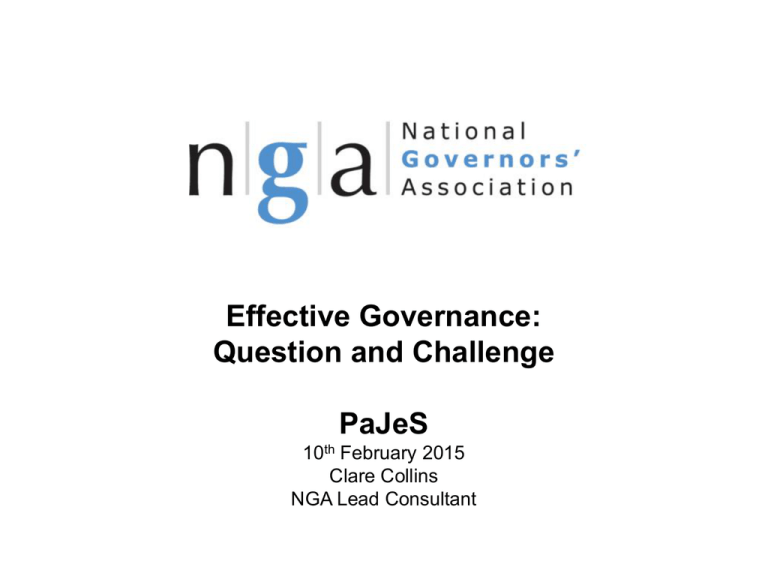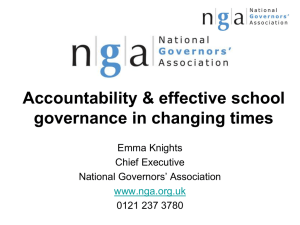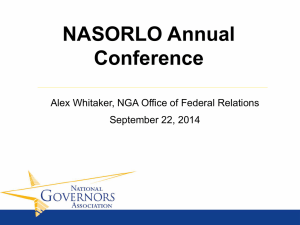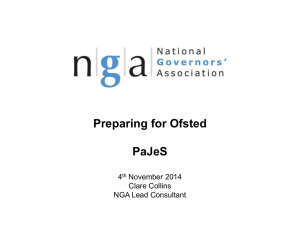to see presentation
advertisement

Effective Governance: Question and Challenge PaJeS 10th February 2015 Clare Collins NGA Lead Consultant © NGA 2013 www.nga.org.uk 1 NGA is a membership organisation • Representing the governors and trustees in all state funded schools in England • Our aim to improve the effectiveness of governing boards by providing expert and tailored information and advice, and challenge when appropriate • NGA is one of the organisations named by the National College for Teaching and Leadership as being able to carry our reviews of governance Standard governing body membership is £75 GOLD governing body membership is £260 and includes an advice line © NGA 2014 www.nga.org.uk 2 Purpose of the session To develop governors’ knowledge and understanding of how governing boards question and challenge by: 1. Understanding the current background and context for governance 2. Identifying the sort of governing board you are 3. Balancing being strategic with knowing your school 4. Looking at questioning and challenge in practice 5. Reflecting on making an impact © NGA 2014 www.nga.org.uk 3 1. The current context for governance © NGA 2014 www.nga.org.uk 4 HMCI: ‘without strong and effective governance, our schools simply won’t be as good as they can be’ © NGA 2014 www.nga.org.uk 5 The message from government • • • The ‘board of governors’ should operate at a strategic level, leaving the head teacher and senior school leaders responsible and accountable to it for the operational day-to-day running of the school. The governing body provides non-executive leadership. Its role is to operate as a board akin to the board of trustees of a charity, or the board of directors of a company. The board should avoid its time being consumed with issues of secondary importance, and focus strongly on three core functions: o Setting the vision and strategic direction of school o Holding the headteacher to account for its educational performance o Ensuring financial resources are well spent DfE advice, January 2014 In other words, they want all GBs to operate as non-executive boards © NGA 2014 www.nga.org.uk 6 2. What sort of governing board are you? © NGA NGA2014 2013 www.nga.org.uk www.nga.org.uk 7 The eight elements of effective governance 1. The right people round the table 2. Understanding role and responsibilities 3. Professional clerking 4. Good chairing 5. Good relationships based on trust 6. Knowing the school – the data, the staff, the parents, the children, the community 7. Committed to asking challenging questions 8. Confident to have courageous conversations in the interests of the children and young people © NGA 2014 www.nga.org.uk 8 © NGA 2014 www.nga.org.uk 9 The consequences of a failure to challenge undermine the running of the school Governors fail to provide enough challenge to the headteacher Improvement planning does not address the real priorities or is not rapid enough Governors do not know what is needed to probe more closely and gather further insight Governors do not know if their actions are having any impact or how good the school really is Performance management of the headteacher is weak because it cannot be based on any meaningful analysis Governors do not know what training they need or what additional governors to appoint Performance management of teachers is ineffective, as it is not linked to achievement The school is incapable of stopping its own decline © NGA 2014 www.nga.org.uk 10 Where does your governing board sit? High support Supporters Club Partners or critical friends ‘We share everything – good or bad’. ‘We’re here to support the head’. High challenge Low challenge Abdicators Adversaries ‘We leave it to the professionals’. ‘We keep a very close eye on the staff!’. Low support © NGA 2014 www.nga.org.uk Governing the School of the Future 11 Exercise On your table … Discuss where you think your GB currently sits – Where are we now – What is working well – What would make things even better Remember, you need evidence of what is working well … and examples of how things could be even better © NGA 2014 www.nga.org.uk 12 The characteristics of strong governing bodies demonstrated in recent Ofsted reports They understand their role and how it complements that of the headteacher. They have a range of skills that brings something extra to the school and to develop a strategic vision. Technical knowledge – of education, data, statutory responsibilities and performance management in particular. They want to see and hear from middle and senior leaders about their work and challenge them on it. They have the skills and time to be a visible presence in the school. They set challenging targets for performance at all levels, including in achievement, teaching and senior management work. They can form their own analysis of the school’s performance without relying on the headteacher. Because of all these they are ‘exceptionally well informed’ about their school. © NGA 2014 www.nga.org.uk 13 Questions • Open not closed – Tell me about – How do you – What is important about – Have you considered – I’m curious, please explain more – Can you compare this to last year • Work through Bloom’s hierarchy of questions – Invite analysis and evaluation as well as information – Look for recommendations about what to do next © NGA 2014 www.nga.org.uk 14 and if you are really stuck … Two stand-by questions: What went well? (WWW) And it would have been even better if … (EBI) © NGA 2014 www.nga.org.uk 15 …and if you are really, really stuck … …is there anything else you want to say? © NGA 2014 www.nga.org.uk 16 4. Question and challenge in practice There is going to be a meeting between the head and the chair to discuss a report Step 1 (2 minutes) Organise into groups of 3, 4 or 5 © NGA 2014 www.nga.org.uk 17 Step 2 (2 minutes) Assign roles (try not to take the role you actually have): Headteacher GB chair Observer / note taker and Vice-chair (if a 4 person group) Deputy head (if a 5 person group) © NGA 2014 www.nga.org.uk 18 Step 3 (5 minutes) 1. Read the role description for your role 2. Read the visit report © NGA 2014 www.nga.org.uk 19 Step 4 (5 minutes) Get into ‘role’ Discuss your approach to the meeting with your partner (chair and vice, head and deputy, or observer if no partner) © NGA 2014 www.nga.org.uk 20 Step 5 (10 minutes) Conduct the meeting … (led by the chair of governors, to explore the implications of the report, and to agree what strategic steps now need to be taken) © NGA 2014 www.nga.org.uk 21 Step 6 (5 minutes) Identify www/ebi Prepare very brief feedback to the group © NGA 2014 www.nga.org.uk 22 Step 7 (10 minutes) Plenary What have you learned from this exercise? © NGA 2014 www.nga.org.uk 23 Governors in these schools know how to challenge and have the right skills ‘The governors receive regular and comprehensive reports from the head teacher and have also requested that heads of subject areas attend meetings of the governing body where they are challenged to explain any remaining gaps in attainment for different groups of students.’ ‘The members of the governing body are extremely well informed and possess a range of skills and expertise to challenge leaders and managers about the performance of the school - there are many established members who are critical friends of the school's leaders and have effectively challenged many aspects of the school's performance including the new curriculum developments.’ ‘The governing body has the knowledge and skills to ask the necessary questions, so that governors can effectively hold the school to account.’ ‘The Chair of the Governing body is capable and astute. He has used his wealth of business experience to support the school in challenging underperformance.’ ‘Governors have an excellent understanding of the link between performance management and the salary structure.’ © NGA 2014 www.nga.org.uk 24 5. Governance making an impact • Set the vision and ethos, including what the children should leave the school having learned • Stay strategic and focused on improvement priorities: leave the operational to school leaders, and delegate • Don’t get overwhelmed by compliance and reviewing policies: focus on principles, delegate procedures • Recruit good school leaders (a future challenge) … and trust them to recruit good staff • Ensure school leaders are equipped to do their jobs, including HR, procurement, legal advice, and CPD © NGA 2014 www.nga.org.uk 25 More resources See on www.nga.org.uk under the heading “Guidance Centre”: • Holding your school to account http://www.nga.org.uk/Guidance/Holding-your-school-to-account.aspx This is a ‘how to’ guide with some examples of questions governors might ask • Knowing your school http://www.nga.org.uk/Guidance/Holding-your-school-to-account/MonitoringPerformance/Knowing-Your-School.aspx This is a longer more complete set of questions with supporting resources detailing the scope and range of issues the questions should be seeking to address Monitor – Evaluate – Act © NGA 2014 www.nga.org.uk 26 Reviewing the session The session has covered: 1. Understanding the current background and context for governance 2. Identifying the sort of governing body you are 3. Balancing being strategic with knowing your school 4. Looking at questioning and challenge in practice 5. Reflecting on making an impact Any questions? © NGA 2014 www.nga.org.uk 27 Evaluation We take your feedback very seriously. This link will be sent though to you in the next few days. Please take a few moments to complete the survey. http://www.surveymonkey.com/s/NGA-consultancy-feedback Thank you © NGA 2014 www.nga.org.uk 28 www.nga.org.uk governorhq@nga.org.uk 0121 237 3780 © NGA 201 2013 www.nga.org.uk 29







